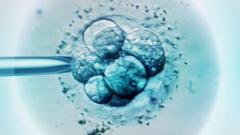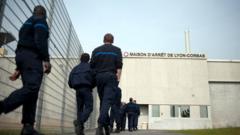A shocking mix-up at Monash IVF in Brisbane, Australia, resulted in a woman giving birth to a stranger’s baby due to the accidental implantation of another woman's embryos. The clinic acknowledged the error, which has led to an official investigation and renewed scrutiny of its practices following a previous significant settlement.
Australian Fertility Clinic embroiled in embryo mix-up controversy

Australian Fertility Clinic embroiled in embryo mix-up controversy
Birth of a stranger’s baby prompts investigation at Brisbane’s Monash IVF clinic after mistaken embryo transfer.
In a startling incident that has raised serious ethical concerns, a woman in Australia has unknowingly given birth to a child that was not biologically hers, after a fertility clinic mistakenly implanted embryos from another patient. The mix-up occurred at Monash IVF in Brisbane, Queensland, and has been attributed to human error, as reported by local media.
Michael Knaap, the CEO of Monash IVF, expressed profound regret over the situation, stating that everyone involved at the clinic is “devastated” by the mistake. The clinic, which has previously faced controversy, including a significant $56 million settlement last year for the destruction of viable embryos, is now under intense scrutiny again.
The troubling scenario unfolded earlier this year when the rightful birth parents requested to transfer their remaining embryos to another clinic. To their surprise, Monash staff discovered an additional embryo still in storage that belonged to a different patient—a revelation that led to the realization that an embryo from another patient had been thawed and erroneously implanted into the wrong woman.
An investigation has been initiated by Monash IVF, with the incident being referred to regulatory bodies for further examination. Knaap emphasized that the clinic believes this mix-up is an isolated case, even as it faces renewed criticism for its procedural integrity.
In a separate but related point, Monash IVF had previously reached a landmark class action settlement with 700 former patients after faulty genetic testing led to the destruction of healthy embryos. The testing inaccurately classified about 35% of the embryos as abnormal when they were, in fact, suitable for implantation and able to lead to viable pregnancies.
In vitro fertilization (IVF) remains a pivotal option for couples trying to conceive, offering hope to many. However, with such incidents raising questions about the reliability of fertility clinics, the emotional and financial stakes involved in the process highlight the crucial need for stringent protocols and transparency in reproductive health practices. According to a report by the University of New South Wales, approximately 20,690 babies were born in Australia and New Zealand through IVF in 2021, underscoring the widespread reliance on these clinics.






















